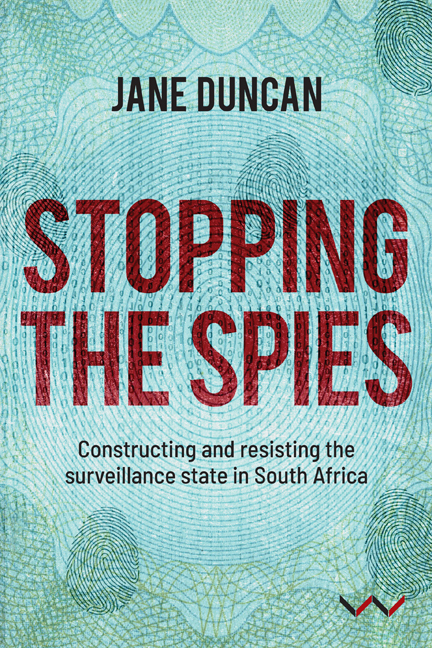Book contents
- Frontmatter
- Contents
- Acknowledgements
- List of Figures and Tables
- List of Acronyms
- Preface
- Introduction
- Chapter 1 Theorising the surveillance state
- Chapter 2 Is privacy dead? Resistance to surveillance after the Snowden disclosures
- Chapter 3 The context of surveillance and social control in South Africa
- Chapter 4 Lawful interception in South Africa
- Chapter 5 State mass surveillance, tactical surveillance and hacking in South Africa
- Chapter 6 Privacy, surveillance and public spaces in South Africa
- Chapter 7 Privacy, surveillance and population management: the turn to biometrics
- Chapter 8 Stopping the spies: resisting unaccountable surveillance in South Africa
- Chapter 9 Conclusion
- Notes
- Select Bibliography
- Index
Chapter 9 - Conclusion
Published online by Cambridge University Press: 17 May 2019
- Frontmatter
- Contents
- Acknowledgements
- List of Figures and Tables
- List of Acronyms
- Preface
- Introduction
- Chapter 1 Theorising the surveillance state
- Chapter 2 Is privacy dead? Resistance to surveillance after the Snowden disclosures
- Chapter 3 The context of surveillance and social control in South Africa
- Chapter 4 Lawful interception in South Africa
- Chapter 5 State mass surveillance, tactical surveillance and hacking in South Africa
- Chapter 6 Privacy, surveillance and public spaces in South Africa
- Chapter 7 Privacy, surveillance and population management: the turn to biometrics
- Chapter 8 Stopping the spies: resisting unaccountable surveillance in South Africa
- Chapter 9 Conclusion
- Notes
- Select Bibliography
- Index
Summary
I started out this book with a series of questions focusing on how concerned we should be about the growth of surveillance in South Africa, and whether it is becoming routinised. I asked to what extent South Africa is becoming a surveillance society governed by a surveillance state, where surveillance becomes a key instrument of social control. I also sought to establish patterns in how surveillance is being practised, and the uses to which it is being put. I was interested to know if the uses of surveillance (to the extent that it was being used) were justifiable or whether they were leading to the major privacy violations that we've seen exposed by Snowden. These questions led me to map the different forms of state surveillance in South Africa, their interconnections (if any), and the democratic controls (or the lack of them) on these capabilities, and their social and political uses.
In Chapter 1, I considered some of the key theoretical debates about surveillance and privacy before and after the Snowden revelations. In this chapter, I made it clear that a political economy, and more specifically a Marxist, analysis made the most sense to me, as it linked the growth of surveillance to the continued reality of class domination, and provided a basis for defining surveillance as involving the collection and analysis of information and the accessing of a person's physical characteristics for the purposes of social control. Such a definition allowed surveillance to be separated out from other, more routine forms of information-processing. Unless the two were separated, surveillance could be normalised, making it less possible to conceive of an emancipated society that can free itself from surveillance. I also looked at whether privacy could be said to be dead in the post-Snowden era, drawing on some of the theoretical debates about privacy and how it should be defined.
In Chapter 2, I argued that there are powerful interests at work in promoting the expansion of the surveillance industry, as arms companies and supportive governments sought new markets because of the declining number of conventional wars. The incorporation of military practices and logics into domestic law enforcement and national security work has created an industrial base for surveillance, allowing for its rapid expansion and even universalisation.
- Type
- Chapter
- Information
- Stopping the SpiesConstructing and resisting the surveillance state in South Africa, pp. 205 - 230Publisher: Wits University PressPrint publication year: 2018



